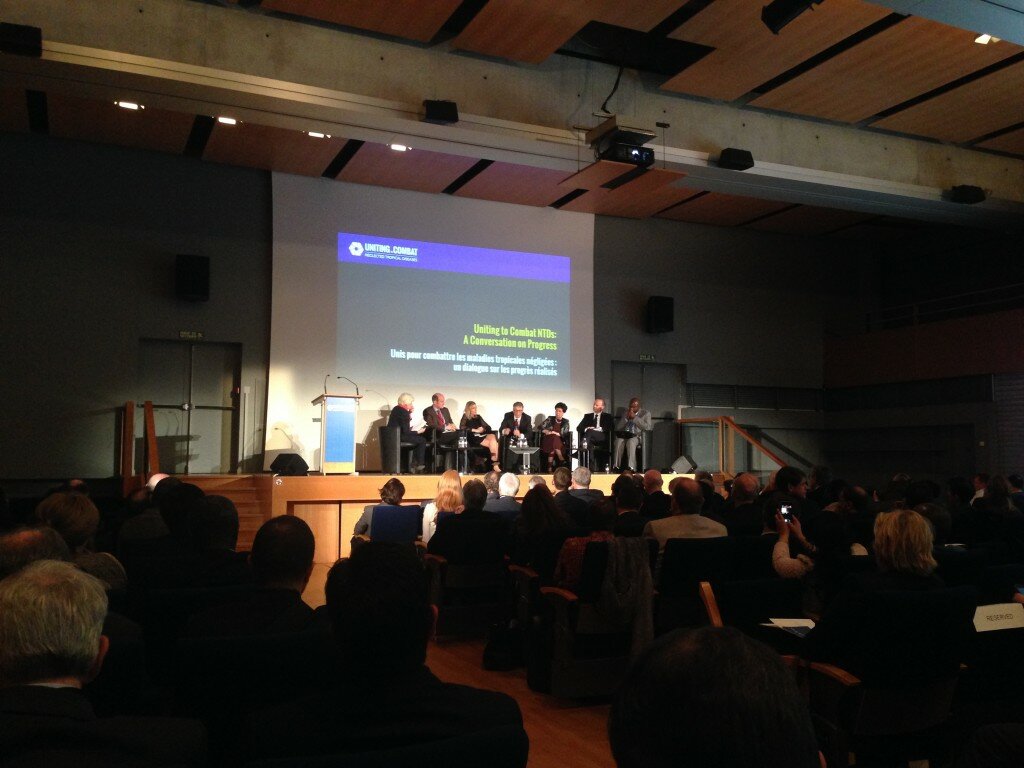This afternoon, global health leaders convened in Paris to discuss progress made in the fight against neglected tropical diseases (NTDs). The event, titled Uniting to Combat Neglected Tropical Diseases: A Conversation on Progress, coincided with the release of a new report highlighting gains over the past two years.
Dr. Margaret Chan, Director-General of the World Health Organization; Bill Gates, Co-chair of the Bill & Melinda Gates Foundation; and several other expert panelists including Chris Viehbacher, CEO of Sanofi; Dr. Onésime Ndayishimiye, National Director of Burundi’s Neglected Tropical Disease & Blindness Control Program; and French Minister of Social Affairs and Health, Hon. Marisol Touraine, announced deepened commitments for efforts to control and eliminate the most common NTDs by 2020 — including a $120 million pledge from the World Bank, a new collaboration to combat soil-transmitted helminthes (STH) and accelerated research and development efforts lead by pharmaceutical companies in conjunction with nonprofits.
The broad reach and attention of today’s event signals the fact that controlling and eliminating NTDs is embraced by a global community of national leaders, policy makers and donors. In addition, there is broad recognition that addressing NTDs is a crucial component of eliminating poverty and achieving development goals.
Echoing this fact, Dr. Tim Evans, World Bank Director of Health, Nutrition and Population stated during the event that NTDs are major constraints to development and addressing them will boost shared prosperity.
As detailed in the Uniting to Combat NTDs report and score card, progress on NTDs has accelerated quickly over the past two years. Pharmaceutical companies are now meeting 100 percent of requests for drugs, and endemic countries taking ownership of NTD programs. To date, 74 countries – roughly two-thirds of all NTD-endemic countries – have now developed national plans to help guide their control and elimination efforts.
Of particular note, Nigeria and Ethiopia, two countries with high NTD burdens, made national commitments to end NTDs. Nigeria launched its master NTD plan in February with the goal of providing treatment to more than 60 million people annually over the next five years. Ethiopia, the country with the highest trachoma burden, launched its national plan in June 2013. Success in Nigeria and Ethiopia would significantly decrease the global burden of NTDs worldwide.
 These positive gains are cause for optimism, but challenges still remain. While the chart to the left (click to view larger) shows a steady increase in drug donation and delivery, only 36 percent of people in need received all the drugs they needed in 2012. Mobilizing more financial resources to support program implementation, doing more to leverage the value of donated drugs and increasing collaboration across sectors are just a few ways the global community can further accelerate progress.
These positive gains are cause for optimism, but challenges still remain. While the chart to the left (click to view larger) shows a steady increase in drug donation and delivery, only 36 percent of people in need received all the drugs they needed in 2012. Mobilizing more financial resources to support program implementation, doing more to leverage the value of donated drugs and increasing collaboration across sectors are just a few ways the global community can further accelerate progress.
While donors, pharmaceuticals and NGOs are an integral part of the solution, endemic countries will drive progress forward by continuing to develop, own and implement their programs in a sustainable way.
“I always believe in country ownership,” Dr. Margaret Chan said. “We’re here to support your efforts.”
We applaud the work done by endemic countries, NGOs, pharmaceutical companies, multilateral organizations and the Bill and Melinda Gates Foundation, and look forward to the path towards 2020.
Click to view the event video and full report.

